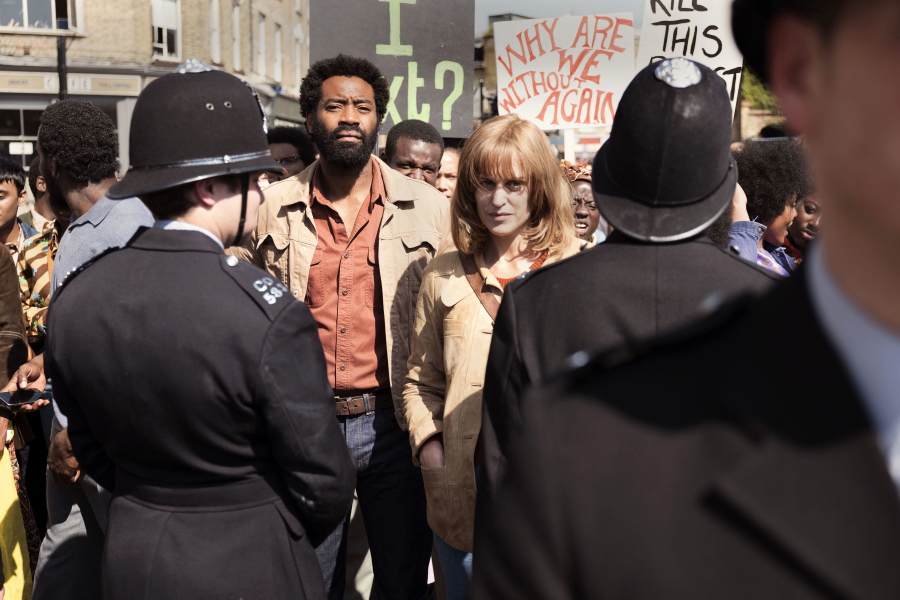Civil rights dramas get a new twist with Showtime’s “Guerrilla,” a limited series from Oscar winner John Ridley that focuses on the Black Power movement of 1970s London.
The ambitious series, which premieres tonight, is likely the first exposure many Americans will have to England’s 20th century civil rights movement, and Ridley attempts to chronicle the tumultuous era in just six hourlong episodes. But the result is a production that’s often as messy, confusing and chaotic as the revolution it depicts.
It’s 1971, and London couple Jas Mitra (Freida Pinto) and Marcus Hill (Babou Ceesay) are small players in a community civil right’s group. Their goal is equal opportunity for the oppressed brown and black minorities of Britain, meaning they must call attention to the discriminatory practices of government, law enforcement and employers.
“Are we citizens or interlopers?” is a question they pose as white resentment toward the influx of immigrant populations from Africa, the Caribbean and South Asia is culminating into a nationalist movement.
After a fellow activist and friend is beaten to death by police during a public protest, Jas and Marcus become architects of a small, violent underground group that seeks equality by any means necessary.
They make headlines when they break violent felon and activist Dhari Bishop (Nathaniel Martello-White) out of jail and connect with other underground groups whose common goal is to overturn a classist and racist power structure. But internal power struggles amid the group are one of the biggest obstacles they face in their undisciplined charge toward self-determination.
“Guerrilla” is hardly writer and director Ridley’s first attempt at dramatizing key moments in the evolution of black-white race relations. He won a screenwriting Oscar for “12 Years a Slave,” created and directed both seasons of the topical ABC series “American Crime” (a multiple Emmy winner) and just completed a documentary on the events leading up to the Los Angeles riots of 1992.
But “Guerrilla” takes on too much in too little of a space given the broad and fairly unexplored subject matter (at least for American viewers) that it tackles. Adding to the confusion, characters here based on real people are mixed with fictional players. And for some reason this Black Power movement is led by an Indian woman. And the IRA is involved.
“Guerrilla” is a who’s who of 1970s radical movements, and by Episode 2 a flow chart is required to keep up with the revolutionary networks at play: The Weather Underground. Black Panthers. German Marxist-Leninists. Rhodesian revolutionaries. The Front de liberation du Quebec (yes, even Canada was radical in those days).
All the groups overlap in direct or indirect ways with Jas and Marcus’ cause and beliefs, and once “Guerrilla” pulls away from American cultural touchstones, it lacks the broad context to keep viewers involved.
Still, Pinto and Marcello-White in particular do a wonderful job reflecting the moral confusion of the era through the actions of their characters. He accidentally shoots a man during an operation and is haunted by the tragedy. She deliberately aims her weapon at a member of the upper class, and once blood is drawn, she wants more.
Idris Elba, who also serves as a producer on the series, provides a more moderate outlook as community activist Kent Fue. Kent and Jas were once a thing, so when she becomes a violent fugitive, other moderates in Fue’s circle try and persuade him to step up as a reasoned voice for the cause.
“You can either drive the narrative or you can get dragged along by it,” he’s told by a fellow activist. “And I am telling you, if someone doesn’t fill this void quick, your ex is going to get us all dragged along.”
Kent prefers to drive, even if it is in bad polyester suits that somehow manage to make heartthrob Elba look frumpy and commonplace. (More points off.)
Despite tackling a subject that is topical now, “Guerrilla” fails to connect the dots between cultures and generations. And what’s a revolution without followers?



